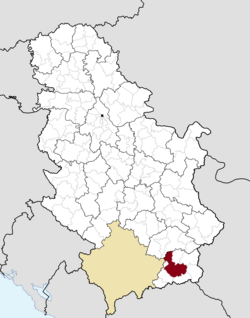Vranje
|
Vranje Град Врање |
|||
|---|---|---|---|
| City | |||
| City of Vranje | |||

Vranje from the hill
|
|||
|
|||
 Location of the city of Vranje within Serbia |
|||
| Coordinates: 42°33′N 21°54′E / 42.550°N 21.900°ECoordinates: 42°33′N 21°54′E / 42.550°N 21.900°E | |||
| Country |
|
||
| Region | Southern and Eastern Serbia | ||
| District | Pčinja | ||
| Municipalities | 2 | ||
| Settlements | 105 | ||
| Government | |||
| • Mayor | Slobodan Milenković (SNS) | ||
| Area | |||
| • Administrative | 860 km2 (330 sq mi) | ||
| Elevation | 487 m (1,598 ft) | ||
| Population (2011 census) | |||
| • Rank | 16th | ||
| • City | 60,485 | ||
| • Administrative | 83,524 | ||
| Time zone | CET (UTC+1) | ||
| • Summer (DST) | CEST (UTC+2) | ||
| Postal code | 17500 | ||
| Area code | +381(0)17 | ||
| ISO 3166 code | SRB | ||
| Car plates | VR | ||
| Website | www |
||
Vranje (Serbian Cyrillic: Врање, pronounced [ʋrâɲɛ]) is a city and the administrative center of the Pčinja District in southern Serbia. The city has a population of 83,524 inhabitants, while the urban area of the city has 60,485 inhabitants.
It is on located on the Pan-European Corridor X, close to the borders with Macedonia and Bulgaria. The Eparchy of Vranje is seated in the city and the 4th Land Force Brigade of the Serbian army is stationed here.
The Romans conquered the region in the 2nd or 1st centuries BC. Vranje was part of Moesia Superior and Dardania during the Roman rule. The Roman fortresses in the Vranje region was abandoned during the Hun attacks in 539–544 AD, These include the localities of Kale at Vranjska Banja, Gradište in Korbevac and Gradište in Prvonek.
The modern name stems from the old word for "black" ("vran") in the Serbian language and first appears in the Alexiad by Byzantine princess and scholar Anna Comnena (1083–1153):
"Thereupon Bolcanus grew bold, as no opponent was left, and devastated the surrounding lands and towns; laid the country outside Scopia in ruins and even burnt some of it. As if this was not enough, he even seized Polobus, and proceeding to Branea laid that all waste, carried off a tremendous amount of plunder from it and then returned to his own country."
...
Wikipedia


